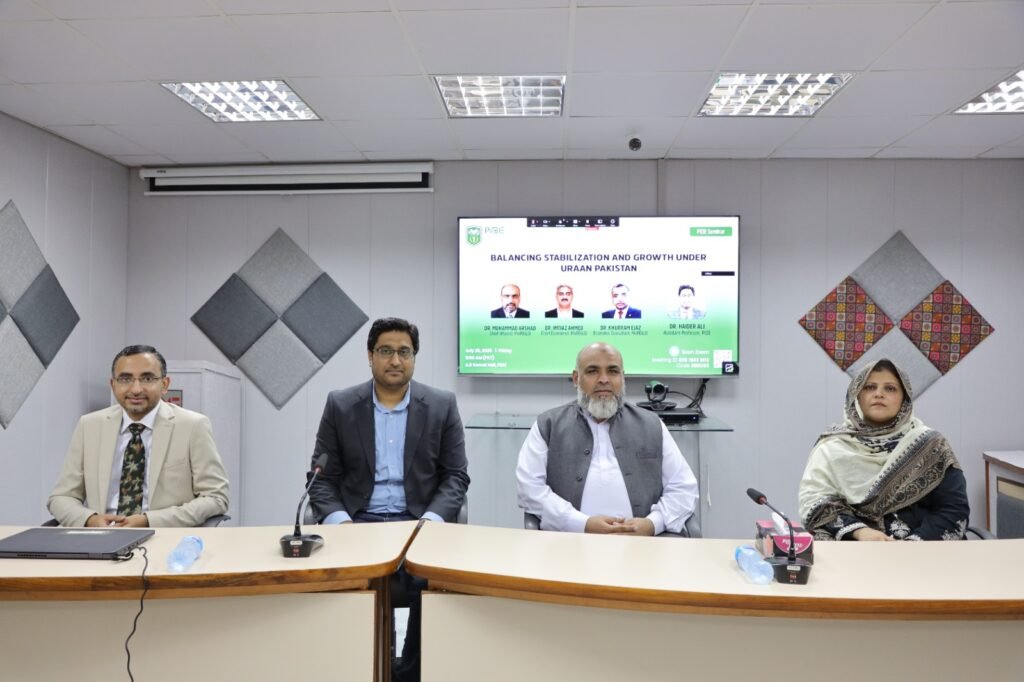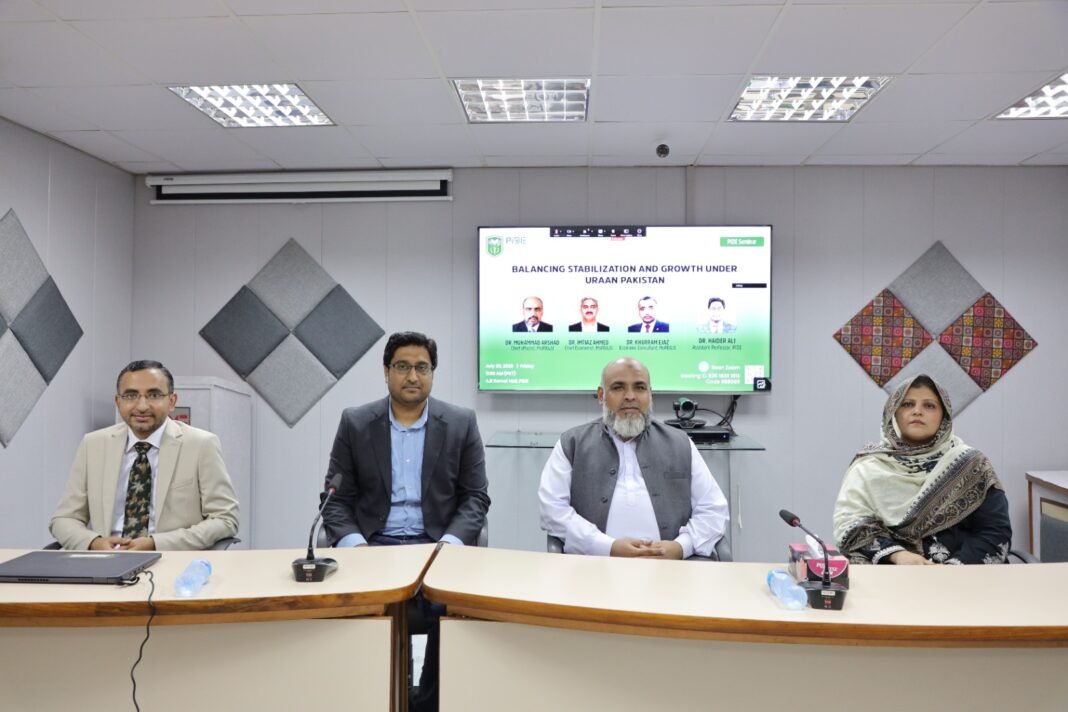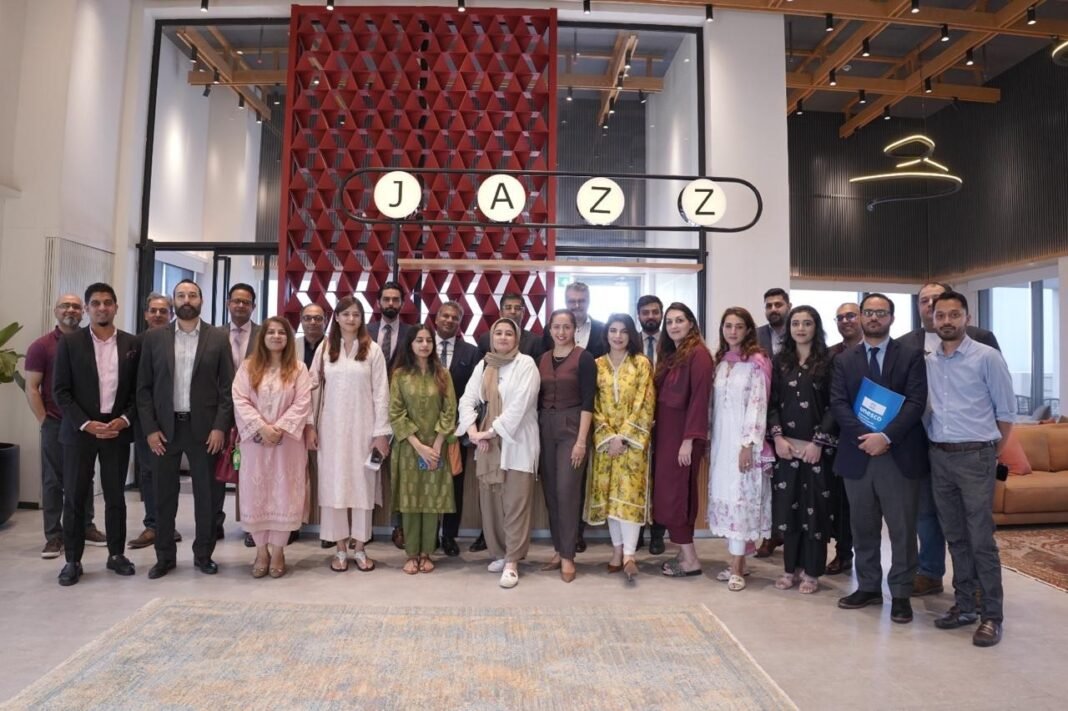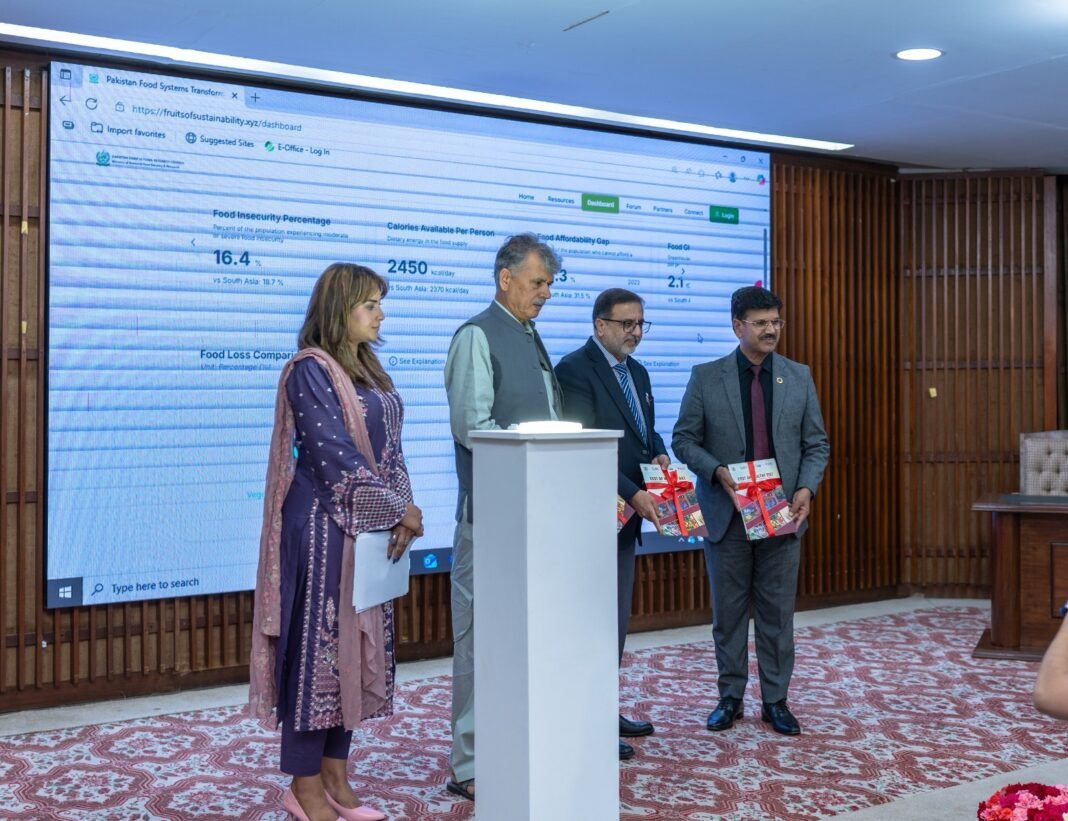
PIDE Sparks Dialogue on Growth Beyond IMF Limits
Islamabad – The Pakistan Institute of Development Economics (PIDE), through its Macro Policy Lab (MPL), organized a seminar titled “Balancing Stabilization and Growth Under URAAN Pakistan”. The event brought together senior officials from the Ministry of Planning, Development & Special Initiatives (MoPD&SI), researchers, and economists to engage in a rigorous policy discussion. The session was moderated by Dr. Haider Ali, Assistant Professor/Director MPL, and featured a panel comprising Dr. Muhammad Arshad (Chief, Macro), Dr. Khurram Ejaz (Economic Consultant), and Naila Dar (Deputy Chief), all representing MoPD&SI.
Dr. Haider Ali explained that the seminar aimed to deliberate on aligning short-term macroeconomic stabilization efforts with long-term sustainable growth strategies under the URAAN Pakistan framework. URAAN Pakistan is a strategic initiative by the Planning Commission built on the “5Es”: Exports, E-Pakistan (digitalization), Environment, Energy, and Equity. He highlighted that despite low growth, Pakistan’s macroeconomic indicators have shown signs of improvement, such as declining inflation (below 5%) and a recent upgrade in the country’s S&P credit rating from CCC+ to B-. However, he emphasized the need to transition from mere stabilization to robust growth.
Dr. Khurram Ejaz presented a comprehensive overview of the current economic context and proposed strategies to move towards a stable growth path under URAAN Pakistan. He noted that Pakistan’s economy has faced a multitude of external and internal shocks, including post-pandemic disruptions, the Russia-Ukraine conflict, and the devastating 2022 floods. These factors pushed the country toward fiscal and balance-of-payment crises, culminating in the signing of an Extended Fund Facility (EFF) with the IMF in September 2024. The IMF program emphasized restoring macroeconomic stability through fiscal tightening, monetary policy, and external sector stabilization. While it succeeded in curbing inflation and modestly reviving growth (estimated at 2.7%), it limited the fiscal space for development spending (PSDP capped at 2.6% of GDP).
Dr. Ejaz contrasted this with the ambitious targets of URAAN Pakistan, which envisions 6% GDP growth by 2029 with significantly higher employment generation. He acknowledged a critical financing gap between what is possible under the IMF framework and what URAAN Pakistan aspires to achieve. He proposed five initial strategies to bridge this gap: (1) repositioning Development Finance Institutions (DFIs) to fulfill their core mandate rather than investing in low-risk securities, (2) migrating suitable PSDP projects to Public-Private Partnership (PPP) mode to crowd in private capital, (3) issuing diaspora, green, and SDG-linked bonds to unlock innovative financing, (4) devolving social sector expenditures to provinces in a phased manner, and (5) reducing losses from State-Owned Enterprises (SOEs) and monetizing non-strategic public assets like ports under a structured asset recycling program.
The presentation prompted a robust discussion. Dr. Nasir Iqbal questioned the underlying assumption that low growth is due to limited PSDP spending. He argued that productivity, export orientation, and youth engagement are more critical to sustained growth than merely increasing public investment. He recommended establishing village-level economic zones, leveraging idle public infrastructure, and simplifying business registration to boost local entrepreneurship.
Dr. Karim Khan emphasized that IMF programs and growth are not inherently contradictory and that sustainable growth must be private sector-led. He urged leveraging CPEC Phase II and capitalizing on productive investment avenues. Dr. Shujaat Farooq added that governance reform and performance-based budgeting are crucial. He highlighted a disconnect between planning and finance ministries and stressed the need to engage provinces, whose PSDPs now exceed the federal government’s in size.
Dr. Muhammad Zeshan noted the inefficiencies within PSDP allocations and tariff structures that perpetuate rent-seeking and protect low-productivity sectors. He advocated enabling emerging industries such as halal meat exports, seafood, and IT, and preparing for the Fourth Industrial Revolution through digitization, cloud infrastructure, and robotics. Mr. Shaaf Najib questioned the long-term impact of PSDP spending, citing studies that showed limited sustainability. He called for improving PSDP efficiency, prioritizing completed projects, and redirecting funds toward sectors with higher fiscal multipliers.
Dr. Mehmood Khalid appreciated the absence of tax rhetoric in the presentation but criticized the lack of growth diagnostics and the absence of evidence from existing research. He emphasized grounding all strategies within the URAAN Pakistan 5Es and aligning projections with realistic economic modeling. Dr. Iftikhar echoed these sentiments, warning against public investment that crowds out private sector liquidity and highlighting inconsistencies in SEZ policies, HEC funding, and NFC allocations.
Dr. Hafsa Hina and several young scholars raised concerns about the realism of projected inflation and growth targets, advocating for stronger macroeconomic modeling and prioritization of primary education returns over higher education. The session concluded with remarks from Dr. Muhammad Arshad and Ms. Naila Dar, who acknowledged the constructive criticisms and reaffirmed the Planning Commission’s willingness to incorporate suggestions into its strategic planning. He emphasized that the government is focusing PSDP spending on near-completion projects and aligning priorities with the 5Es.
In his final remarks, Dr. Shujaat Farooq reiterated that Pakistan’s growth challenges are less about strategy and more about implementation, coordination, and accountability. He urged integrating line ministries, defining measurable KPIs based on policies and frameworks, and improving budget credibility. He emphasized the importance of including the private sector, reforming public institutions, and preparing the youth with relevant skills to ensure inclusive and resilient growth.
The seminar served as a candid and constructive exchange between policymakers and researchers, marking the beginning of a collaborative effort to refine and operationalize URAAN Pakistan. Participants unanimously agreed on the need for realistic planning, productivity-enhancing reforms, provincial coordination, and evidence-based policymaking to navigate Pakistan toward long-term, inclusive growth under fiscal constraints.
Sohail Majeed is a Special Correspondent at The Diplomatic Insight. He has twelve plus years of experience in journalism & reporting. He covers International Affairs, Diplomacy, UN, Sports, Climate Change, Economy, Technology, and Health.






![logo-1[1]](https://globalnewspakistan.com/wp-content/uploads/2025/01/logo-11-e1737618310315-300x187.png)